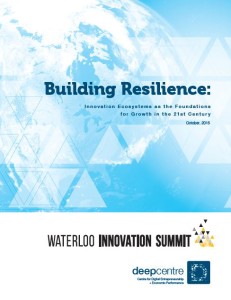In mid-September, the DEEP Centre joined the University of Waterloo and Communitech at the annual Waterloo Innovation Summit. The Summit, hosted in partnership by the University of Waterloo and Communitech, brought together over 250 innovators, entrepreneurs and academics to discuss the best ways to nurture high growth through innovation ecosystems.
 On Friday, the DEEP Centre’s report on the event was released. The report highlights three key themes that emerged as central during the 2015 Waterloo Innovation Summit. These three themes are Foundations for Growth, Scaling Up, and Embracing Risk and Disruption. The report provides a brief review of each theme as well as links to follow-on reading material and related WIS insights. Alongside these reviews is a series of immediately actionable priorities for the further development and refinement of innovation ecosystems around the world. Download a copy of the report here.
On Friday, the DEEP Centre’s report on the event was released. The report highlights three key themes that emerged as central during the 2015 Waterloo Innovation Summit. These three themes are Foundations for Growth, Scaling Up, and Embracing Risk and Disruption. The report provides a brief review of each theme as well as links to follow-on reading material and related WIS insights. Alongside these reviews is a series of immediately actionable priorities for the further development and refinement of innovation ecosystems around the world. Download a copy of the report here.
The following are seven themes, or recommended areas for action, that emerged during three days of discussion. An abbreviated version of these actionable priorities were published in the Globe and Mail.
Invest in necessary infrastructure and connectivity Fully developing a region’s innovation ecosystem potential means making the rapid, instinctive movement of talent, capital and ideas a priority. Seoul’s arrival as an innovation hub is no doubt tied to its status as the world’s most wired city thanks to ongoing billion-dollar investments in digital infrastructure. Investments in physical infrastructure are just as important. In Canada, investing in the Toronto-Waterloo Region corridor is a necessary next step.
Move beyond startups to scaleups Recognizing the significant contribution that high-growth companies make to employment and economic prosperity, jurisdictions around the world are focusing increasing attention on ‘the art of scale.’ And while all ecosystems are seeking to nurture the types of high-potential firms that will serve as anchors for future growth, performance in this area remains uneven. Canada, a clear underachiever, must concentrate resources, mentorship and programming in this area as a necessary next step in the evolution of its innovation ecosystems.
Extract better ecosystem data You can’t improve what you don’t measure. While the availability of data within and about innovation ecosystems varies, the paucity of consistent, standardized data related to significant public investment in startup assistance organizations, venture capital funds and other systems of public support undermines the ability of policymakers to engage intelligently and effectively. This information gap, moreover, undermines the ability of actors to learn, adjust and – ultimately – to build better ecosystems. This gap needs to be addressed.
Take a more aggressive approach to the recruitment of high-tech management talent Among the most significant challenges facing high-growth firms is a dearth of management talent. While developing this talent organically is a must, firms that currently demonstrate the clear potential to become global powerhouses cannot afford to wait. They need this talent now. Actually, some of them needed it yesterday. Canada’s private and public sector leaders must consider how best this talent can be identified, recruited, and moved to where they are needed.
Better enable and support industry-academic partnerships Large incumbent firms play an integral role in the economy and in the growth of startups and small and medium size enterprises (SMEs). However, while the largest firms have easy access to academic partnerships, SMEs struggle to configure productive industry-academic relationships. Funding for industry-relevant problem labs structured akin to InnoCentive’s crowdsourced problem solving platform is a necessary next step.
Focus on building effective research and development support systems The movement to create innovation ecosystems (or startup communities) has become a global phenomenon. Policymakers are increasingly recognizing that this is where the most important economic growth happens. That said, they are not moving as quickly to retool their R&D support policies. How and where this support is delivered is important. Jurisdictions that underperform with respect to business expenditure on research and development (BERD) or gross expenditure on research and development (GERD) must reconsider both the scale and method of their funding systems. Meeting these challenges requires a focus on outcome-oriented policy.
Pursue disruption While the aforementioned focus on business investment is necessary, there are also other innovative ways to create a more aspirational business and technology culture, one that is not only capable of identifying and adapting to incoming disruptive forces but capable of pursuing and promoting the disruption itself. Initiatives such as the X-Prize Foundation and the Elon Musk’s Hyperloop are examples of how the world’s best and brightest are invited to take on seemingly impossible challenges in return for very large monetary rewards and contracts. The dynamics set in train by these competitions generate teams and technologies which simply would not have existed otherwise. This phenomenon, born and perfected in Silicon Valley, is worth considering by others as a very effective device for deliberately, intentionally generating disruption in pre-selected areas.
You can download a copy of the report here, and you can read DEEP Centre co-founder Dan Herman`s Globe and Mail op-ed (with WIS Chair David Fransen) that summarizes the 7 key actionable priorities that are highlighted in the report here.